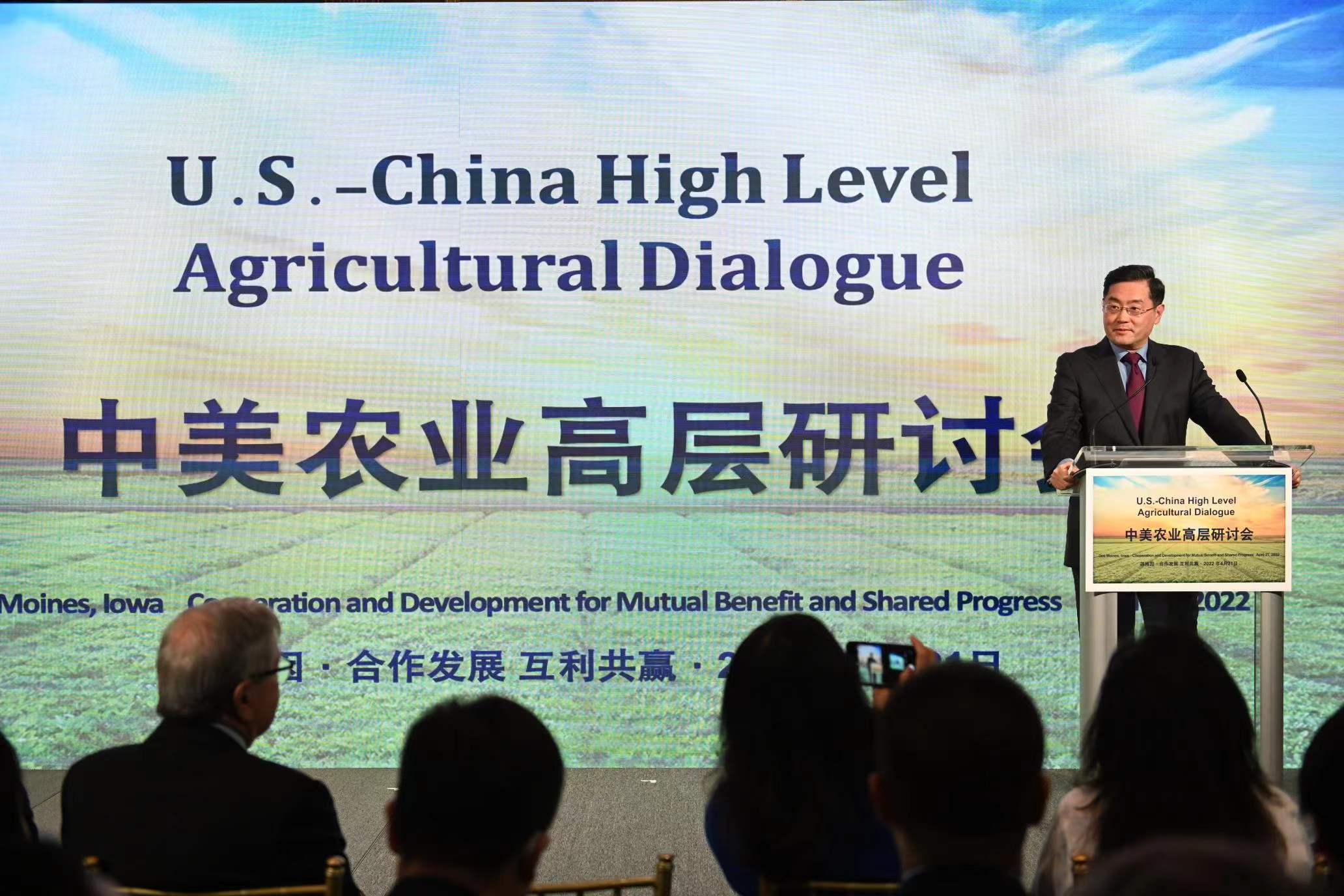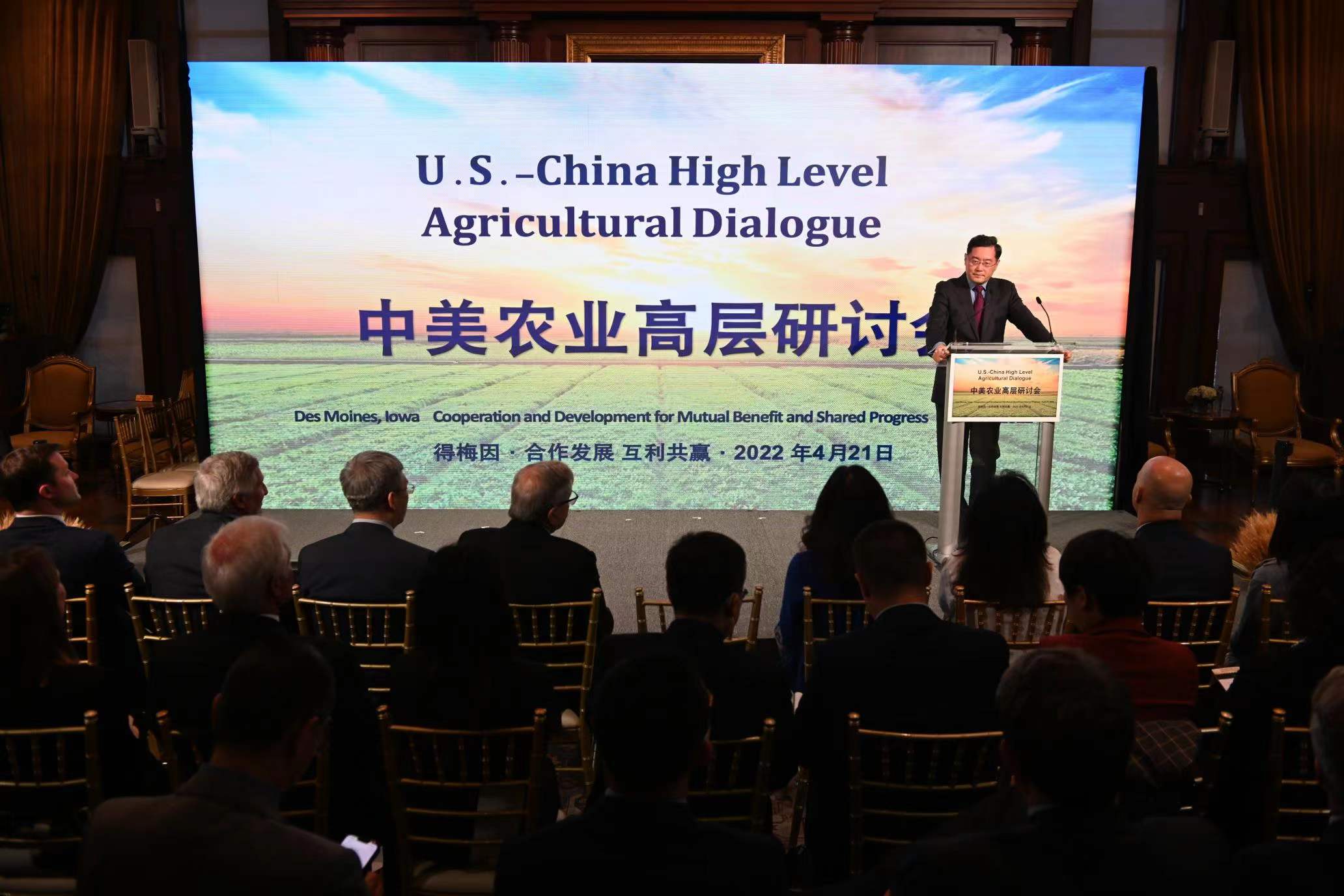 中文
中文

Ambassador Branstad,
Governor Holden,
Ambassador Burns,
Ambassador Quinn,
Ladies and Gentlemen,
Friends,
It is my great pleasure to visit Iowa, the second stop of my trip to the Midwestern states. Iowa is known as the “Tall Corn State”. Coming to Iowa gives me a great opportunity to see for myself the boundless black soil, and have a hands-on experience of the down-to-earth and refreshing farm work here. When I arrived yesterday from Illinois, it was raining hard and cold. But today, we have warm sunshine, just the right weather for sowing seeds. I can feel that not only spring is in the air, but Iowa Nice is also in the air! Indeed I’m surrounded and overwhelmed by the warm friendship.
My trip to America’s Heartland to me is a journey of HEART, which aims to: Help Establish Amicable Relations and Trust, H-E-A-R-T, and Help Enhance Agricultural and Rural Ties, H-E-A-R-T.
In April 1985, President Xi Jinping visited Iowa for the first time, during which he learned about local agriculture and animal husbandry. He was warmly received by local residents, and that has sown the seeds of China-US friendship and agricultural cooperation. Ten years ago, in the early spring, President Xi returned to Iowa, a trip named by US media as “Cornfield Diplomacy”. Just at the World Food Prize Foundation Hall of Laureates building, where we are now, he attended the 2012 China-US High-level Agricultural Symposium, and delivered an important speech titled “Writing a new chapter of China-US win-win cooperation in agriculture”.
In the speech he sincerely hoped that China and the US will deepen agricultural exchanges and cooperation to make our agriculture more developed, rural areas more prosperous, and farmers better-off.
Today, the cornfield diplomacy goes on. We are gathering here again to review the past ten years and look to the future of our agricultural cooperation. This carries special significance, not only because the seeds of friendship and cooperation sown by President Xi have taken root and grown up, but also because with the resurging pandemic, fragile global recovery, faster climate change, and growing regional conflicts, food security has again become a major practical issue facing China, US and the rest of the world.
China is the world’s biggest agricultural importer, and the US the largest exporter. When Chinese people's aspiration for a better life meets US quality agricultural products and advanced agricultural technologies, new potential has been emerging for agricultural cooperation. Strategically speaking, promoting win-win agricultural cooperation will not only improve the variety of food supply for the Chinese people and increase the income of American farmers, but also make global food supply more stable and certain, and contribute to global fight against climate change.
In the past ten years, agricultural trade between China and the US has grown by a total of 10.5 billion dollars. The US has become China’s second largest source of agricultural import and third largest agricultural export destination, and China remains the No. 1 export market for American agricultural products. In the past ten years, our agricultural science and technology exchanges have been fruitful. We have exchanged over 100 intergovernmental technology groups, with nearly 700 mutual visits. Such exchange programs have helped Chinese and American agricultural scientists and educators establish contacts, and effectively promoted the joint R&D and application of new technologies. For a long time, organizations like China Agricultural Association for International Exchange and American Heartland China Association and many enterprises in both countries, such as Syngenta and Continental, have served as a bridge of communication and cooperation in this process. Thank you for your meaningful job!
In my current visit at the “golden corn belt”, I went to a dry-mill ethanol and DDGS facility and a dairy farm. I have felt keenly from them how nice and sincere, how friendly and hard-working American farmers are, just the same as Chinese farmers. I have also come to know that the US agriculture is going through low-carbon and green transition, where farmers apply advanced technologies and methods for carbon capture and storage, and use quality feeds to reduce methane emission. China has set the targets of reaching carbon peak before 2030 and carbon neutrality before 2060. To realize these targets, it is necessary to utilize advanced technologies, experience and seeds to address climate change in agriculture. This will definitely create new opportunities for China-US agricultural cooperation.
Ladies and Gentlemen,
In the past two years, China has made tremendous efforts to fully implement the phase one trade deal. Despite the pandemic, we have not used the force majeure clause, and have even adopted a market-based exclusion process for the countermeasure tariffs on US soybeans, grains, meat, aquatic products and fruits. This fully shows our sincerity and goodwill. In 2021, our agricultural trade reached 46.4 billion dollars, hitting a record high, and China’s agricultural imports from the US stood at 38.85 billion dollars, a growth of 64.8% from an already high base in 2020. Such a rate was higher than the 28.6% growth of China’s agricultural imports from the world, and much higher than the 23.3% growth of US exports to the world. According to the US Export Report 2022 recently issued by the US-China Business Council, as China implemented the phase one trade deal, US farmers exported billions of dollars more in oilseeds and grains and over a billion dollars more in meat products, which improved the well-being of farmers in America’s Heartland. The growth in these exports provide thousands of new jobs to more than a dozen congressional districts. Iowa’s 4th, Kansas’s 1st, and Nebraska’s 3rd districts all had increases of more than 5,000 jobs. Facts have proved that China-US economic and trade relations are win-win in nature, and to restore normal trade ties between the two countries as soon as possible is the shared call of both sides.
Ancient Chinese wisdom believes that agriculture is the foundation of the world. Dr Norman Borlaug, an Iowa native and Nobel Peace Prize Laureate, also said: food is the moral right of all who are born into this world. With 1.4 billion people, securing food supply mainly by ourselves is the most important thing we can do for global food security. We must not only feed them, but we must feed them well. At the same time, we never turn our back on international markets and resources. The door of Chinese market is open to the world. China and US are naturally compatible and complementary with each other in agricultural trade, and our potential for agricultural cooperation is unlimited.
We need to deepen economic and trade cooperation, promote two-way and normal agricultural trade, remove existing barriers such as additional tariffs, and create a stable business environment for the industry. We need to strengthen cooperation in science, technology and education, focus on sustainable development, reinforce technological support, and cultivate young agricultural scientists and technicians. We need to step up policy and information exchanges, restore the agricultural dialogue mechanism as soon as possible, and enhance communication. We need to build up international synergy and play a due role as major countries in safeguarding global food security.
As we face a complex and severe situation in agricultural development and food security worldwide, I firmly believe that China and the US, as major agricultural producers, consumers and traders, should meet challenges together, maintain stable development of agriculture, enhance the resilience of agricultural supply chains, ensure food security domestically, and promote cooperation for international food security. This will certainly be helpful for maintaining world peace, promoting global economic development and social stability, and delivering sustainable development. Let’s bear in mind: no food, no stability, no peace. That’s the value of the good work of Ambassador Quinn and your colleagues at World Food Prize.

Ladies and Gentlemen,
I toured the Hall of Laureates before speaking here, and saw all the names of the World Food Prize laureates. One of them was well-known Chinese agricultural scientist Mr. Yuan Longping. Mr. Yuan once famously said, “Be a good seed.” This was not only the cause of his lifetime, but also a portrayal of his integrity and big heart as a person.
With Mr Yuan’s teaching in mind, I have come to Iowa, the heart of America and the warmth and friendship of the people in Iowa touches my heart, and my heart also goes to the people in Iowa. As we have warm sunshine today, I believe the farmers of Iowa will start to sow their seeds tomorrow. Let’s work together, in this sowing season, for the future of China-US relations, for the wellbeing of our two peoples, and for becoming a good seed, with HEART!
Thank you!